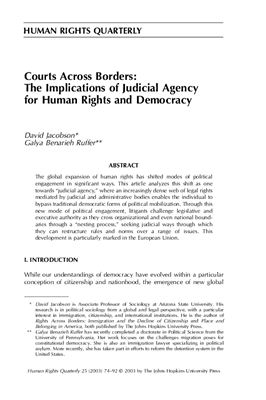Human Rights Quarterly 25 (2003) 74–92 © 2003 by The Johns Hopkins
University Press
The global expansion of human rights has shifted modes of political
engagement in significant ways. This article analyzes this shift as one
towards judicial agency, where an increasingly dense web of legal rights
mediated by judicial and administrative bodies enables the individual to
bypass traditional democratic forms of political mobilization. Through this
new mode of political engagement, litigants challenge legislative and
executive authority as they cross organizational and even national boundaries
through a nesting process, seeking judicial ways through which
they can restructure rules and norms over a range of issues. This
development is particularly marked in the European Union.
The global expansion of human rights has shifted modes of political
engagement in significant ways. This article analyzes this shift as one
towards judicial agency, where an increasingly dense web of legal rights
mediated by judicial and administrative bodies enables the individual to
bypass traditional democratic forms of political mobilization. Through this
new mode of political engagement, litigants challenge legislative and
executive authority as they cross organizational and even national boundaries
through a nesting process, seeking judicial ways through which
they can restructure rules and norms over a range of issues. This
development is particularly marked in the European Union.

